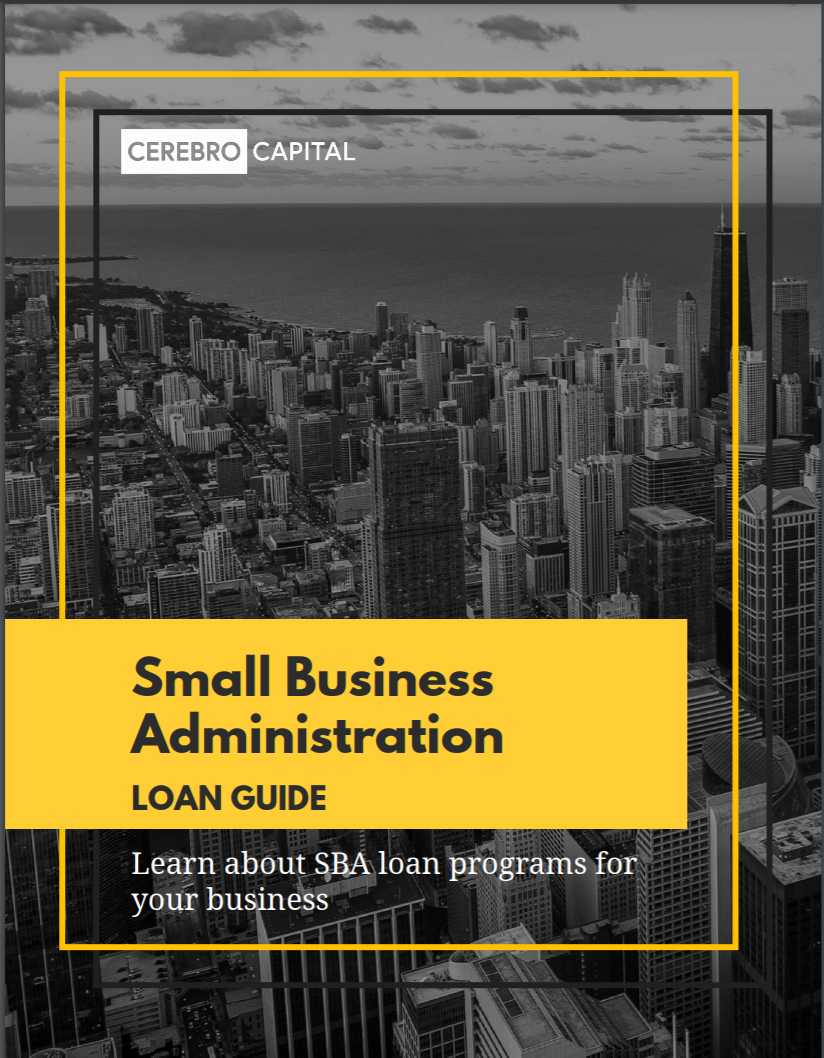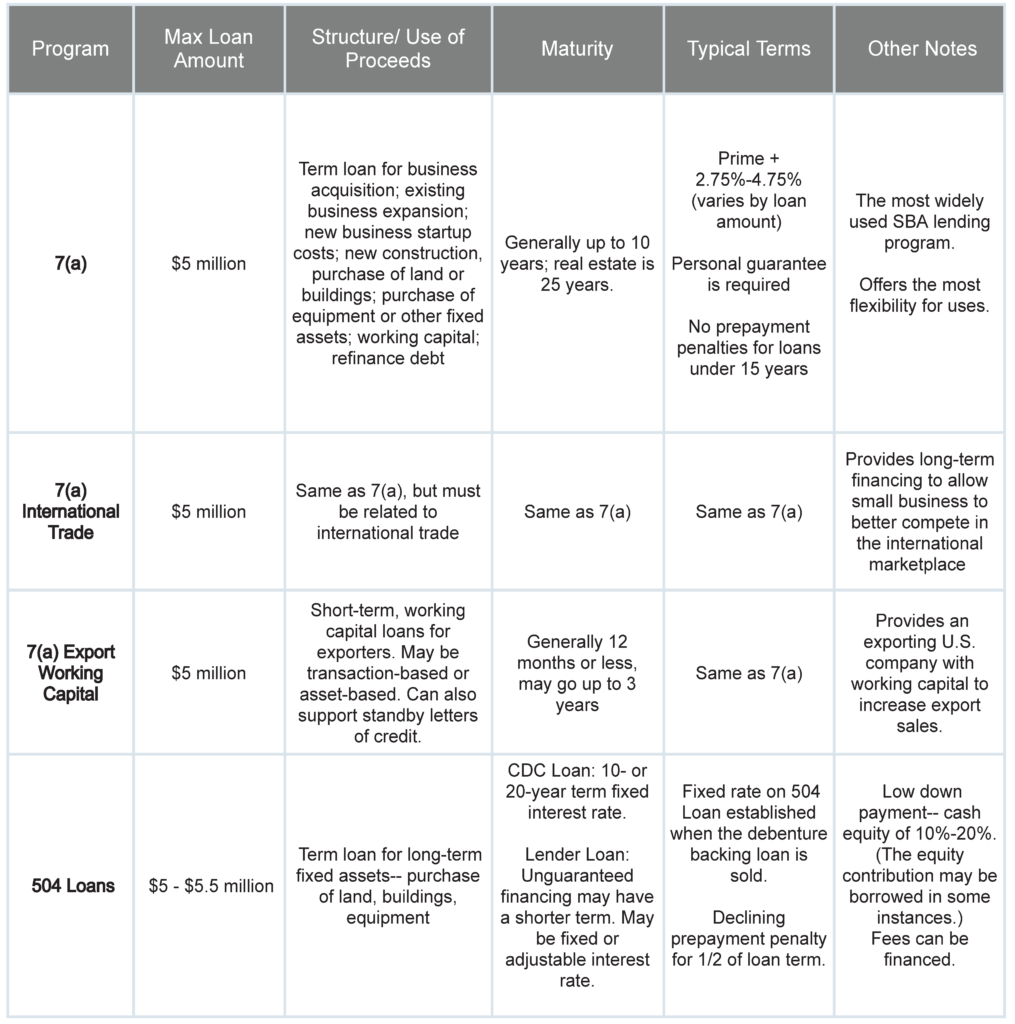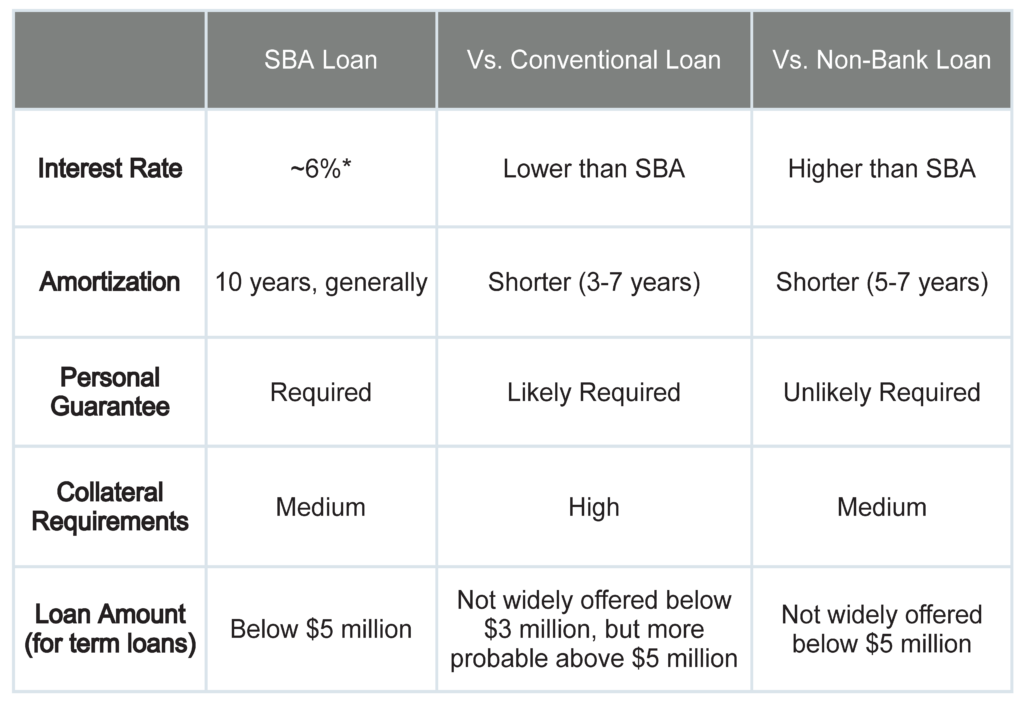WHITE PAPER
SBA Loan Guide
Learn about loan qualifications and which type of SBA loan is right for your business

OVERVIEW OF SBA LOAN PROGRAMS
As a small or medium-sized business, you’ve likely heard about “SBA loans”. However, you might not know exactly what they are, how they’re structured, or if they’re a good fit for your business.
In this guide, we’ll walk through everything you need to know about SBA loans—what they are, how to qualify for one, frequently asked questions and misconceptions, and how Cerebro’s data-driven process, expert capital markets team, and vast SBA lender network can quickly and easily get you the best SBA loan options in the market.
What is an SBA loan?
The Small Business Administration (SBA) is a U.S. government entity whose mission is “to maintain and strengthen the nation’s economy by enabling the establishment and viability of small businesses…”. As part of this mission, the SBA’s lending programs offer business loans that are partially guaranteed by the agency, meaning that the SBA will “stand behind” a portion of the loan. In other words, should a borrower default on their SBA loan, the SBA will reimburse the bank for a portion of its incurred losses. This guarantee reduces risk for bank lenders and in turn allows more American small businesses to access capital.
It’s important to note that the SBA does not originate SBA loans itself. Instead, the SBA works with commercial banks and other approved financial institutions to originate loans.
SBA LOAN PROGRAMS
The SBA offers a variety of loan programs that differ based on loan size and purpose. Some of the terms in an SBA loan are standard and dictated by the SBA’s Standard Operating Procedures (maximum loan amount, loan maturity, maximum interest rates), while others vary widely lender-to-lender (effective interest rates, debt service coverage requirements, closing costs and fees).
The SBA provides dedicated programs for loans below $500,000, including 7a Small Loans, SBAExpress, Export Express, or Non-7a Microloans. More information on these loans can be found in the SBA’s Quick Reference guide.
The 7a loan structure provides a great option for business acquisitions, refinancing, working capital, or expansion capital for U.S. small businesses, and will be the focus of the rest of this guide.
DID YOU KNOW?

The USDA has specific loan programs for rural development. If your business meets these qualifications, you may be interested in learning more about USDA loans:
Borrowers are US citizens or legal residents Projects must be located in a rural area– a city or town with fewer than 50,000 residents
SBA LOAN TERMS DETAIL
The table below outlines SBA loan terms in more detail:

SBA 7(a) LOANS
What kinds of businesses qualify for an SBA 7a loan?
The SBA has outlined qualifications for the 7a program. Your business must:
- Operate for profit
- Operate in an eligible industry (for example, gambling or finance
businesses are ineligible) - Meet the SBA’s size standards of a “small business”
Be engaged in business in the United States - Use alternative financial resources, including personal assets, before seeking SBA financing
In addition, the owner or owners must be:
- U.S. citizens or Lawful Permanent Residents
- Willing to provide a personal guarantee )
- Willing to provide 10-20% of cash equity if financing an acquisition
DID YOU KNOW?

Specific industries that are ineligible for SBA Loans include:
- Gambling
- Lending
- Real estate investment
- Coin or stamp dealers
- Charitable or religious organizations
Review a full list of ineligible businesses and industries.
How do SBA 7a loans vary from other loan programs?
The biggest difference between SBA loans and other types of commercial loans is the SBA’s loan guarantee. The SBA’s guarantee provides a backstop for the lender in an event of default, reimbursing the lender for some of the potential losses and in turn eliminating some of the risk of making the loan.
The SBA can guarantee up to 90% of a loan in some instances. This allows lenders to extend credit in situations where they otherwise would not– some businesses may not qualify for conventional loans or non-bank loans and an SBA 7a loan is their only debt option. Additionally, SBA loans may require less business collateral than conventional loans or non-bank loans. Since an SBA loan is backstopped by both the SBA’s guarantee and a personal guarantee from the borrower, lenders can get more comfortable with a business collateral shortfall.
Finally, the SBA offers longer loan maturities and advantageous interest rates. SBA loan terms are 10 years in most cases, providing a long repayment period with lower monthly principal and interest payments.
While SBA loan interest rates aren’t quite as low as some conventional loans, the long repayment terms still offer a low monthly payment. That said though, SBA interest rates are much lower than the double digitinterest rates from non-bank lenders–SBA interest rates are typically in the mid-single digits.
COMPARE LOAN TYPES
In our SBA loan guide, you’ll discover how SBA loans can offer competitive terms for business financing. Take a look at how the terms compare with other loan solutions.

*Approximate SBA 7a interest rate at time of publication.
For clarity, conventional loans are offered by commercial banks and do not carry a government guarantee. Non bank loans are offered from institutional lenders that are not regulated in the same way as a commercial bank. Generally speaking, nonbank lenders offer greater flexibility but are designed for larger companies.
WHAT YOU NEED TO KNOW ABOUT PERSONAL GUARANTEES
SBA loans require a personal guarantee from anyone who owns 20% or more of the business applying for the loan. A personal guarantee is an agreement the borrower signs that authorizes a lender to use their personal assets to pay back the SBA loan in an event of default. Personal assets most often include the owner’s personal real estate, savings or retirement, or investment accounts.
In personal finance terms, a personal guarantee is similar to the business owner becoming a co-signer on the loan. Coupled with the SBA’s guarantee, the personal guarantee allows the lender to make a loan where they otherwise would not have extended credit.
It’s important to note that even though a lender can attach a lien to the owner’s personal residence, they aren’t always allowed to collect on it (i.e. seize the property in an event of default). A number of states offer what are called homestead exemptions, which protect the primary residence from creditors. Some states like Florida, Texas, Iowa, Kansas, Oklahoma, and South Dakota, have homestead exemptions that can protect 100% of the equity in the property. Other states like New Jersey and Pennsylvania do not have any exemptions.
There are many states that protect up to certain dollar amount, some of which include limits on property size. Please consult with your accountant and/or legal counsel to determine if you live in a state where homestead exemptions would apply.
Finally, If you have a second mortgage and are applying for an SBA loan, it’s important to share this information so your SBA lender can determine if it’s an issue and how to mitigate it.
TOP FAQS ABOUT SBA LOANS
1. Can I avoid a Personal Guarantee in an SBA loan?
No. A personal guarantee is required from every individual who owns more than a 20% stake in the company.
2. I want to use an SBA loan to buy a business but I don’t have any cash. Am I eligible for an SBA loan?
No. But, if you have liquid assets like stocks or bonds, you may liquidate and use the proceeds for your equity contribution. Additionally, you can reduce the cash needed by having the seller provide cash equity via a seller note. However, a new business owner must provide a minimum of 5% new cash equity (at least half of the typical 10% requirement) in order to qualify.
3. Why do term sheets vary from lender to lender?
SBA loans are underwritten and issued by individual lending institutions rather than through the government agency. Each SBA approved lender has the right to decline any deal requests even if they technically qualify. Further, some lenders sell their SBA loans on the secondary market, which means that they might be more aggressive in bidding on opportunities in order to make a return on the sale. Finally, closing costs and loan fees also vary by lender, based on their own internal processes and costs incurred throughout
closing.
4. Are there prepayment penalties on an SBA loan?
Sometimes. On a loan term of 15 years or more, the prepayment schedule is 5%-3%-1% (5%
in Year 1; 3% in Year 2; 1% in Year 3). For loan terms shorter than 10 years, there is no
prepayment penalty.
5. My personal credit is “just okay”. Can I still get an SBA loan?
Possibly! The SBA and most of its lenders are generally okay with a few small marks on your personal credit history. Generally, the lender is reviewing the strength of the business and if it can support the payments. However, if you have an open, not-yet discharged bankruptcy, active collections, or the like, it is prudent to clean up your personal credit before applying for any business loans.
GENERATE LENDER INTEREST IN YOUR SBA LOAN REQUEST
Since lenders underwrite SBA loans individually and loan proposals can vary from lender to lender, it’s considered a best practice to approach multiple SBA lenders. However, once the borrower has reviewed the term sheets, and selected a winning lender, there should only be one application sent to the SBA for approval. Leveraging competitive pressure at the term sheet phase is beneficial to the borrower; conversely, keeping lenders in the dark about the process once the borrower is ready to apply to the SBA could be detrimental to the approval process.
Additionally, having a complete and accurate loan package is the best way to ensure a smooth process. The more comprehensive and organized your package is, the more qualified and sophisticated you appear as a borrower.
Loan Package Specifics
- Last 3 years of business financials including P&L and balance sheet
- Last 3 years of business tax returns with the most recent year dated within 12 months of application
- Company overview & CVs/resumes of owners/management
- Detailed explanation of the use of proceeds and financial projections if available
- Complete & accurate SBA forms (Forms 1919 Part I and II; Form 912, Debt Schedule)
- Personal financial statements for all owners (own more than 20% of company)
- Last 3 years of personal tax returns (if different than business)
Note: For a business acquisition, the financial statements and tax returns will need to be
provided for the target business and the existing business (if applicable)
SBA LOANS FOR BUSINESS ACQUISITIONS
Is an SBA 7a loan a good fit for acquisitions?
Yes, SBA 7a loans are great options for acquisition financing! When used for the acquisition of a business or the buyout of an existing partner, the 7a program offers the same advantageous rates, longer repayment periods, and more competitive loan terms.
Who can use an SBA 7(a) business acquisition loan?
New owners: A person or entity that’s not currently an owner who purchases 100%
ownership of the target business; a small business that’s acquiring 100% ownership
of another existing small business; or an employee stock ownership plan (ESOP)
that purchases a majority share (51%) in the business.
Existing owners: Existing partners/owners of a business can use a 7a loan to buy
out other owners, so long as it results in 100% ownership by the remaining owners.
Additional considerations
- Lender may require a business valuation report to underwrite the loan
- Seller must provide tax returns for last 3 years of business to validate financials
- Buyer should have an executed LOI (Letter of Intent) in place
- Allow sufficient time for the loan to close and be sure that expectations are managed and met
Required equity contribution for new owners
When the purchase involves a complete change of ownership, the SBA requires the new owner to make at least a 10% equity contribution (contribution of their own personal cash towards the acquisition). The 10% is based on the total project
cost of completing the transaction, which is typically not limited to only the agreed-upon purchase price. The total project cost includes seller financing and loan fees, and closing costs, for example.
It’s important to note that seller financing, or a “seller note”, can only be considered as part of the equity injection if it totals 50% or less of the required equity injection and it is fully subordinated until the SBA loan is repaid in full.
For example, if a business was being sold for $3,000,000 inclusive of all seller financing, closing costs, and SBA fees, the new buyer would need to have $300,000 in new cash equity. But if the seller was willing to provide cash equity of $150,000 in a separate seller note on full standby (i.e. not to be repaid until the SBA loan is paid off), the buyer’s new cash equity requirement would drop to $150,000. It’s important to remember that these are minimums and some lenders may want to see more cash equity for your loan request to be considered “stronger”.
What is a seller note/seller paper?
A seller note is used when the seller of a business agrees to “finance” a portion of the purchase price by receiving loan payments from the buyer in lieu of cash at closing.
Important considerations for seller notes
- May require subordination to SBA loan if cash flow is insufficient to service both the 7a loan and the seller note
- Lenders may require a “standby” period, or a set period of time where the seller note cannot be repaid. As a seller note is a debt obligation, a seller note increases total debt service and reduces cash flow available for payment of the SBA loan
- Seller notes cannot include any “earnouts”, or clauses that agree to pay the seller more money if the business achieves certain financial or performance goals
- The seller cannot remain an equity owner of the business after the sale and must exit the business in-full within 12 months
- For clarification, they may remain onboard as a paid consultant or as an
manager during this 12-month period
Applying for an SBA loan has a bad reputation of being a long and laborious process. Because an SBA lender has to take an additional step of submitting each loan to the SBA for approval, it can take longer than other loan programs.
Further, because borrowers have no direct contact with the approvers at the Small Business Administration, they can often feel left in the dark.
One way to speed up the process is to work with an SBA Preferred Lender, or PLP, who has the authority to approve loans without needing to wait on the extra step of review at the government agency. PLP lenders have the SBA’s authority to approve loans in-house on their behalf. This “power of the pen” can significantly reduce the amount of time required for closing and funding an SBA loan.
STEPS TO SECURE SBA LOANS
Overall timeline: 12 weeks to close and fund the loan after the loan package has been sent to lenders.
1. Submit loan application & financial package
Lender review
Credit Committee approval
2. Receive term sheets (1-3 weeks)
Meet lenders
Answer questions
3. Select a winning lender and sign term sheet
Confirmatory diligence
Underwriting documentation
4. Diligence review & close
The Cerebro Advantage
Offering higher loan amounts, longer repayment terms, and better interest rates than other options, an SBA 7a loan is perhaps the best fit for small and medium-sized businesses seeking debt capital.
Cerebro Capital offers an expert team & data driven software tools to help you determine if an SBA loan is right for you. If you are interested in applying for and SBA loan, Cerebro has four easy steps:
1. Complete Loan Application
2. Provide copies of financial statements, tax returns and PFS
3. Receive email notifications when lenders review your application
4. Receive term sheets within 1 week of submitting loan package
Cerebro will pre-qualify your business for SBA lending eligibility. Once your loan request is ready to take into the market, Cerebro will help you navigate the entire application and lending process, start to finish.
Testimonials
“Having access to Cerebro’s targeted group of lenders has given us confidence that we are getting the best deal in the market.”

Co-Founder
Capital Advisory Services
“Thank you! Without Cerebro it would have taken significantly longer to find the right lender.”

CFO
Manufacturing
“Working with Cerebro gave us more leverage and options than just working with our existing lender.”

COO
Travel Technology Industry
Ready to get started?
Join the thousands of mid-sized companies who have used Cerebro.
- info@cerebrocapital.com
-
12 W Madison St.
Baltimore, MD 21201 - Cerebro Capital
- @cerebrocapital




